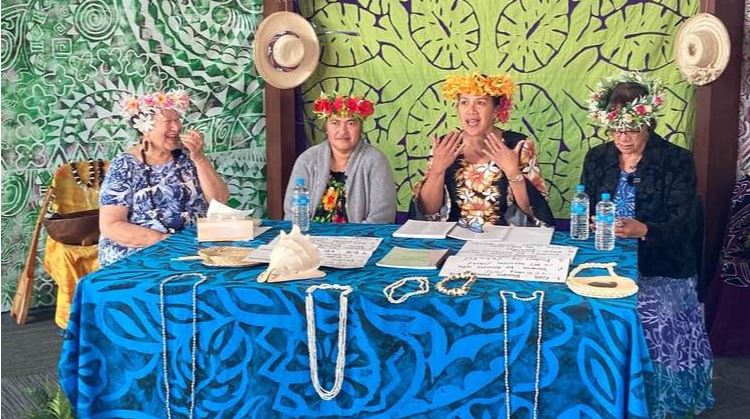Educational filmmakers triumph for Kuki Airani Reo
Thursday 25 August 2022 | Written by Supplied | Published in Culture, National

Presenter Mama Teremoana Maua-Hodges with Pukapukan representatives Kitiona Tauira, Rite Parau and Teremoana Yala. Photo: SUPPLIED/22082410
Community leader Mama Teremoana Maua-Hodges in Porirua, Wellington is spearheading a project called E Reo Nuku that consists of a series of ten 30-minute video resources. Mama Teremoana is the Presenter, and it is being co-produced by Taputukura Raea, aided by facilitator Samson Samasoni who is providing directorial guidance.
This trio grappled with a lot of difficulties roping this project together, so to say that the journey to production was a hard one would be an understatement.
“Our dream was to deliver videos to educate and inform,” Mama Teremoana says.
Mama Teremoana, who has a degree in Adult Education, has been leading the charge to create the opportunity to educate Kuki Airani Reo. She has been teaching the language since 2013 at Porirua College.
It was there in those halls teaching the young students, she began to notice a peaked interest coming from the parents who were unfamiliar with the language. The parents’ motivation and dedication to those classes revealed there was a hunger and a need to learn their “mother tongue”.
And that’s how it all started but the struggles continued. The quest for more funding was always on-going until they hit the 2021 Covid-19 Lockdown, which brought the project to a screeching halt. This hiatus bought them more time to prepare for the production yet created a roadblock that only time could resolve. And so it did; however during that time Samson Samasoni was able to secure the additional funding and resource support to bring the project to fruition.
Meanwhile, Mama Teremoana and Taputukura had to contend with a trial of their own – the campaign for inclusivity, representation and authenticity with co-operation from the Wellington Kuki Airani community.
Mama Teremoana was adamant on this, “we are not one island, we are many islands. We are not one language, we are many languages, and many cultures”.
Many of these islands have their own unique culture and traditions that many Cook Islanders living abroad are unaware of. These marginalised islands and their languages are often overlooked and have gone on underappreciated by the wider community of Aotearoa.
“I found that there were many resources to learn the Rarotongan language but not so many about the languages, cultures and traditions of the other islands,” says Taputukura.
So they required the co-operation of those of the Kuki Airani Community residing in Porirua from these less represented islands. They were met with some scrutiny and rejection from each of these respective groups. And rightfully so, who were these people to come in and portray their languages and share their knowledge and culture to the wider world. A foundation of trust had to be built to move forward.
Issues of politics and money came into question and at the end of it all, it came down to who saw themselves rightfully fit to represent these islands. Respective presenters and cultural representatives were vital to the operation of the series.
“When Enua (island groups) were first approached to be involved in the production, there were valid concerns about how the videos would be distributed, who owned the copyright and ensuring they were not going to be used commercially. The issue of who owns indigenous knowledge or how it can be used, is complex,” says Taputukura.
“This was difficult. There was a fear that people would pinch their knowledge,” says Mama Teremoana.
Ultimately, they managed to overcome this gradually, one step at a time. A lot of care and effort on their parts, meeting with ten different Enua, for ten different episodes dedicated to each ten islands represented, these particular islands were selected by their inhabitants. A discussion was opened to them all to ensure the protection of their indigenous cultural traditions.
Samson Samasoni worked with them to process these concerns. They used the Local Contexts Traditional Knowledge Labels (TKL) process and were able to agree and define attribution, access and usage rights for the cultural knowledge captured in the videos.
“We are excited that this project can pave the way for diasporic indigenous communities to officially record, and articulate their stewardship and care for cultural knowledge,” says Taputukura.
Overall, by the time the final preparation for the production was about to take place, fifty people were involved, with the students transforming their class into a set and working with Oriana TV to film each video.
“Each and every one of the community representatives spoke, sang and shared their knowledge from the heart. It showed that their knowledge is ingrained in them, that they wanted to share the stories of their ‘ipukarea’ (ancestral home),” says Taputukua.
- Reporting by Tagata Pasifika




















































